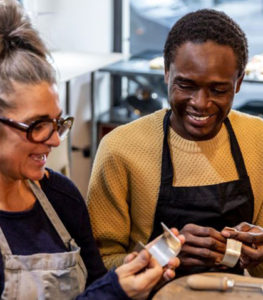Meaningful work the key to refugee self-worth – study finds
A new study has found that refugees, like everyone else, want meaningful work that makes a difference and not just jobs that simply pass their time.
Researchers at the UK’s Teeside University looked at how the asylum process impacted on access to meaningful and dignified occupation.
 They found getting a meaningful job could improve the lives and wellbeing of recent migrants.
They found getting a meaningful job could improve the lives and wellbeing of recent migrants.
“Participants illuminated the potential of occupation to enhance their post migratory experience. They identified the importance of keeping busy, but the frustration of low demand activities which lack meaning,” said lead researcher Dr Helen Hart.
“They demonstrated the desire to ‘keep busy with purpose’, using occupations to rise above their status as ‘asylum seeker’ and foster a sense of their personal value and worth,” Dr Hart said.
The study found that individuals seeking asylum experience a complex set of socio-legal circumstances which limit opportunities and undermine their sense of worth; and that the challenges of the asylum process impact significantly on many aspects of daily life, reducing access to meaningful and dignified occupation.
Altruistic occupations, like volunteering, were highlighted in the research as particularly meaningful.
“Individuals found that ‘doing for others’ provided the opportunity to express their virtues and values, enabling them to flourish, fulfil their potential and experience satisfaction,” the report said.
“At a time when opportunities are restricted, individuals require enormous drive, resourcefulness and energy to find and engage in meaningful everyday activities. Whilst any occupation may be valuable, virtuous occupations may have the potential to foster a ‘light side’ of occupation, countering the negativity that surrounds and devalues people seeking asylum, and fostering wellbeing in the short and long term,” it said.
The study, titled ‘Keeping Busy with Purpose’ also found that the denial of occupation was a denial of human worth.
“If occupation is a means to express identity and demonstrate one’s value, and the opportunity to do so is deliberately removed, to reduce positive outcomes such as well-being and integration, it is an act of wilful cruelty,” the research study said.
“Refugees and people seeking asylum are more than inmates in a ‘civilised prison.’ They are men, women and children with lives before, lives now, and lives to come,” it said.
“As occupational therapists or occupational scientists we have a role to play in using the skills and potential from past lives, minimising the challenges of asylum life in the here-and-now, and creating the means of a productive future.”
The found that individuals crave the opportunity to engage with occupations, but that in order to bring the greatest benefit the occupations need to be meaningful occupations.
“This study has contributed unique insights into the role of higher purpose occupations, and a need for occupational constancy, both of which are not explored by other authors in the field. Participants’ raised the potential of occupation to redress the impact of the undermining experiences of asylum. By accessing occupations with meaning, and the potential to promote occupational constancy, they felt enabled to ‘keep busy with purpose’ and foster their best selves,” the report said.
The findings show the particular value attached by the participants to occupations that they do for the benefit of others, the ones which are the best reflection of their virtues and values.
“However, the decision to limit or prevent occupational engagement also tells us how powerful occupation can be. It appears that successive governments have feared the potential of occupation to embed people in UK society and help them build their lives here,” Dr Hunt said.
“I would argue that this study tells us that occupation, correctly harnessed, can push back against the hostilities, enabling individuals to reflect their many virtues and show their worth,” she said.












